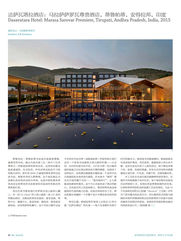The Dasavatara Hotel Interior Design
Hospitality Interior Design I Tirupati, Andhra Pradesh
Client Marasa Hospitality Pvt. Ltd.
Area 1.15 Lakh Sq. ft
Status Completed 2015
Photographer Rajesh Vora, Himanshuu Sheth
Team Shimul Javeri Kadri, Sarika Shetty, Michelle Pereira
The Dasavatara Hotel is one of the very few projects in the country that strikingly takes after the Hindu Temple design in organization and experience.
The most venerated, and wealthiest temple trust in India, Tirumala – Tirupati, is considered to be the sacred abode of Lord Vishnu, one of the three supreme deities in the Hindu Trinity. The practice of religion here is devout and ritualistic with great faith being invested in the idol and the customs of the temple. The temple is visited by 20 million devout pilgrims annually requiring organised crowd management.
Hotel at the foothills of the Saptagiri mountain range
The area is considered auspicious for wedding rituals and celebrations and caters to discerning business travellers who like to combine leisure conferences with a divine temple visit. The brief required us to build a 121 key boutique Hotel on a 13150 Sq.m plot of land, at the foothills of the Saptagiri Mountain range.
Functions of the hotel
The functions included Guests rooms & Suites, Banqueting facilities a Business centre, a Health centre with a Spa, Gym, a Games room & a Swimming pool and 2 Specialty restaurants.

Nestled in the foothills of Saptagiri hills, the 121 key boutique Dasavatara Hotel is an ode to the restful experience of divinity. Set on a 13150 sq.m site, the hospitality project’s planning responded to the serene vistas through a progression of public to private spaces. The hospitality interior design strategy of using local materials in a contemporary way helped redefine a conventional pilgrimage-based hotel into a contemporary, comfortable cultural destination.
A central water body, overlooking which residential, leisure and restaurant functions are located, infuses life and vibrancy in the experience. The use of local stone cladding and touches of traditional craft creates relationships with the local, while using clean lines and uncluttered edge details. Dasavatara’s uniqueness also lies in the material storytelling of its interior spaces, drawn from spirituality, mythology and symbolism.

































